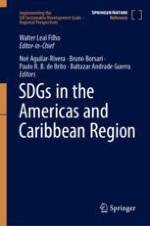Abstract
Climate change communication (CCC) is a key aspect of the United Nations’ Action for Climate Empowerment (ACE) guidelines (UNESCO and UNFCCC, Action for Climate Empowerment: Guidelines for accelerating solutions through education, training and public awareness. UNESCO Publishing, 2016). CCC, which consists of public awareness, public participation, and public access to information, is expected to ensure that citizens are informed about climate challenges and risks, while fostering climate action and resilience. During the past decade, policy interest and academic research in CCC have increased, although most studies have been focusing on Global North contexts.
The lack of internationally comparable data around CCC, especially in the Global South, weakens policy advocacy, undermines national and regional target-setting, and impedes monitoring processes. While the prevalence, uneven quality, and lack of comparability of relevant data are salient issues in many regions, they are especially acute in Latin America and the Caribbean (LAC) (Eise et al., Climate change communication research: a systematic review. SSRN Electron J, 2020).
In this chapter, findings from a systematic exploration of data availability and quality regarding public awareness, public participation, and public access to information regarding climate change among countries in the LAC region are reported. More than 80 relevant datasets have been reviewed, most of which are complete, although some are still in process. A small set of the most promising data sources based on the following four criteria have been reviewed:
1.
Validity: data collection has been peer-reviewed and, in the case of a survey, refers to a nationally representative sample.
2.
Temporal coverage: data refers to at least two points in time within 2015–2030.
3.
Accessibility: disaggregated data is open and free to access.
4.
Geographical coverage: the data covers at least 50% of the 197 UNFCCC members and at least 1 LAC country
(Much of the analytical strategy employed in this chapter draws from a larger and more comprehensive study, known as the Monitoring and Evaluating Climate Communication and Education (MECCE) project (mecce.ca). MECCE is a 6-year partnership grant with core funding from the Social Sciences and Humanities Research Council of Canada and under the direction of Professor Marcia McKenzie from the University of Saskatchewan and the University of Melbourne. While the reported analyses are aligned with several MECCE project objectives, they do not represent an official outcome of the MECCE project).
Overall, this chapter highlights major data gaps in climate change communication in Latin America and the Caribbean regions. Identifiable inequalities are pointed out. Policy implications are highlighted especially if urgent steps are not taken by national and regional authorities to remedy the current situation.
